5 key points from celebrated futurist Roger Spitz’s keynote address in Paris
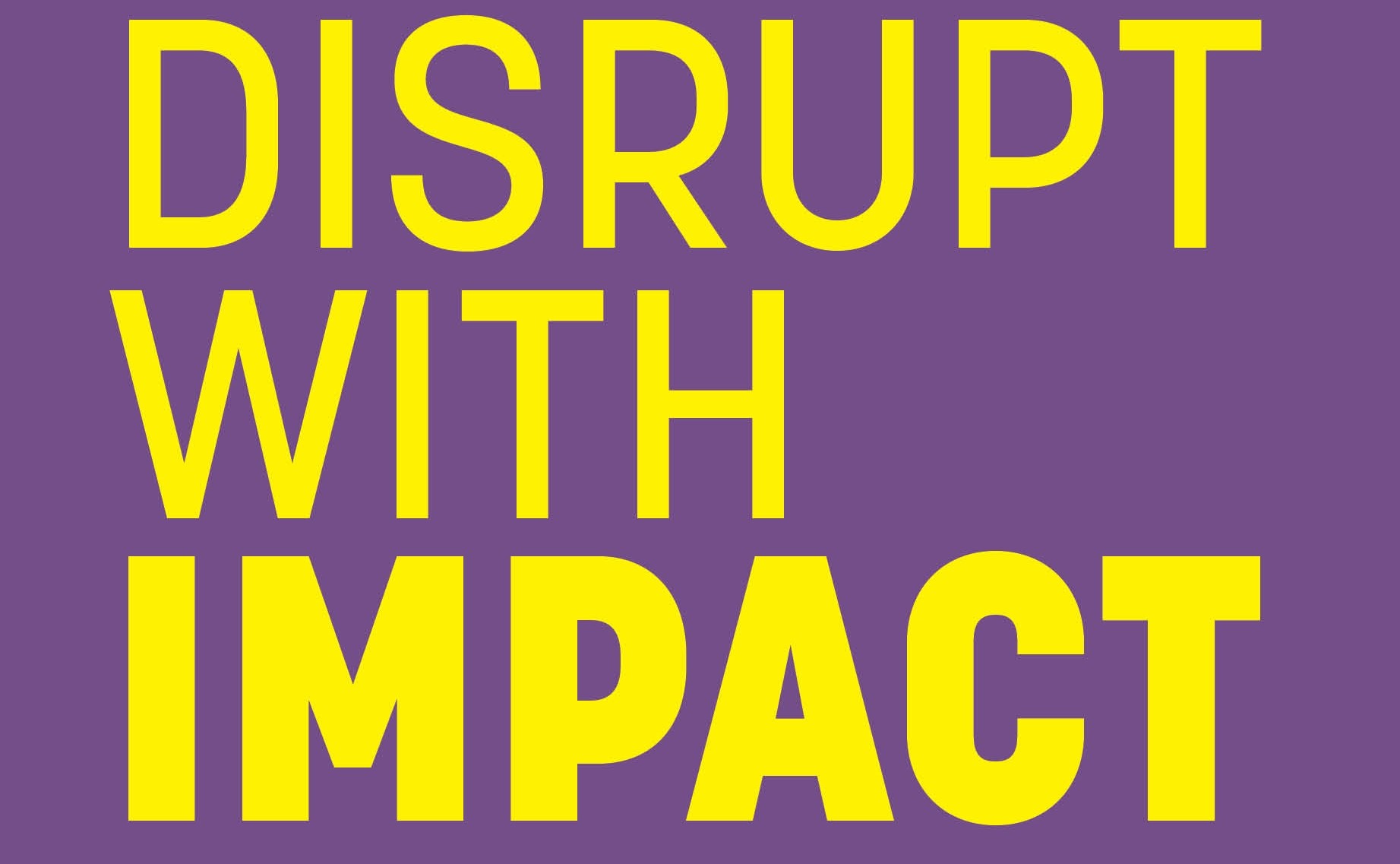
Cyber attacks, wars, pandemics, AI replacing humans, climate change, the splinternet, disinformation, and polarizations… What is happening in the world, and what can we do about it?
This is just the tip of the iceberg when it comes to the world’s inherent unpredictability. Any one event – or an intersecting confluence of changes – can rewrite the world’s economic landscape, altering the fate of industries, professions, and nations overnight. Events presented as “historic” or “unique” are becoming commonplace.
In this environment, where “unprecedented” becomes the norm, our understanding of the world must evolve.
On November 5, 2024, the “think-and-do tank” La Fabrique du Futur invited the celebrated author and futurist Roger Spitz to deliver a keynote address on his latest bestselling book – ‘Disrupt With Impact’ – in partnership with ISC Paris and HEC Paris Alumni. Members of Le Club Stratégie de l’Entreprise de HEC Alumni, ISC Paris alumni, and many others gathered at the ISC Campus in Paris to attend his talk, which explored the existential challenges that face humanity today – as well as tools we can use to address them.
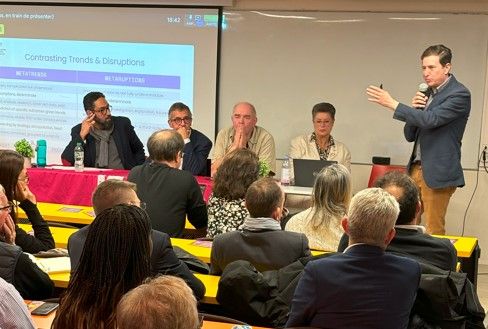
Source: Photo from “Disrupt with Impact, une conférence exceptionnelle avec Roger Spitz” at ISC Paris [5/11/2024]
Present at the event, as both its organizers and as Q&A panelists, were the renown Dr. Fabienne Goux Baudiment, Founding President of proGective; Eric Seuillet, President of La Fabrique du Futur; Christian Lemaire, HEC Alumni & lead Le Club Stratégie de l’Entreprise de HEC Alumni; and Dr. Lotfi Karoui, Dean of Faculty and Research at ISC; who all made insightful introductory comments to set the scene and provide context.
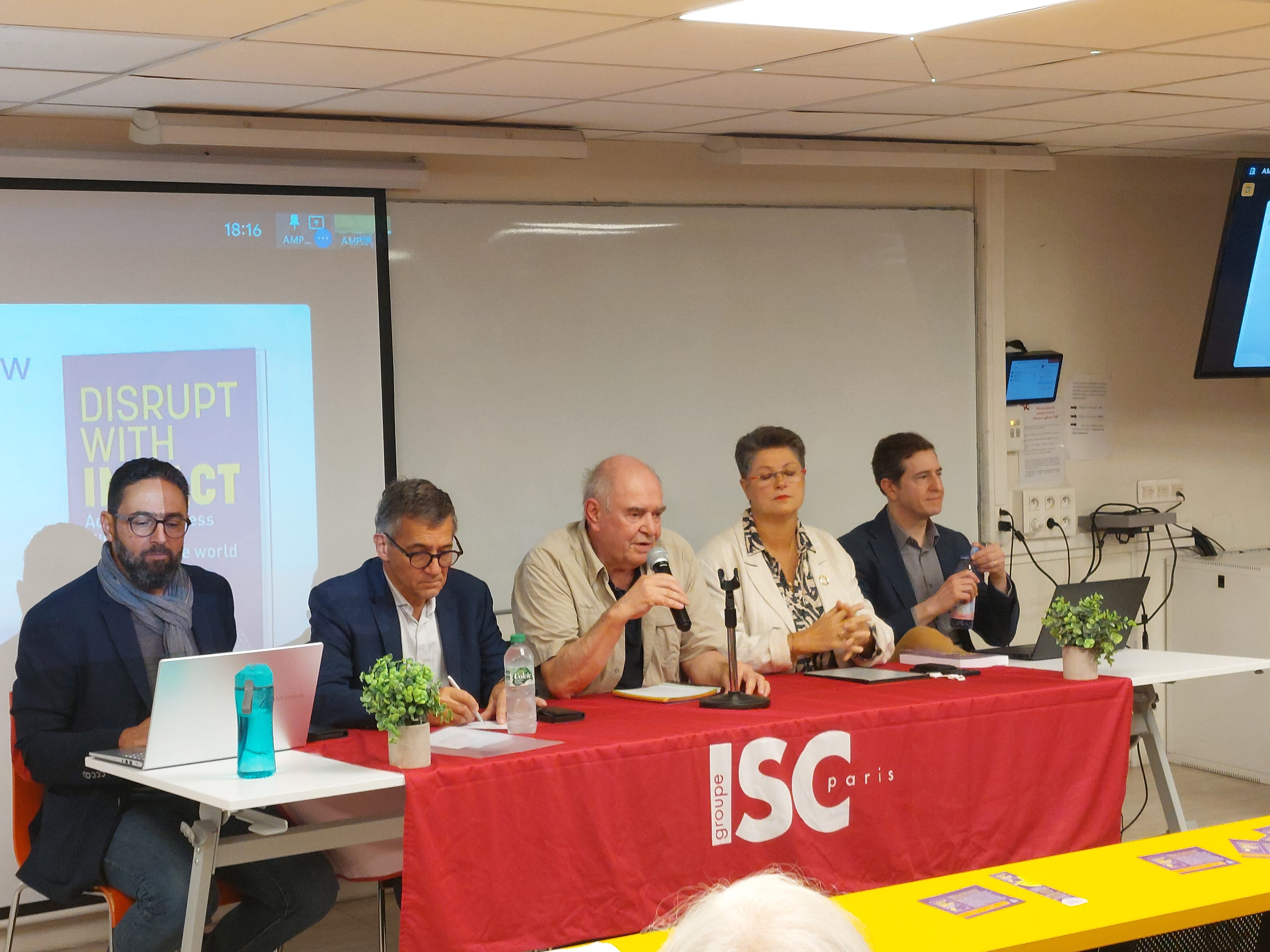
A core insight from the panel’s discussion: The outdated formulas of yesterday don’t apply to today’s changing world. Legacy strategies carry diminishing effectiveness in unpredictable environments. The most challenging aspect of trying to determine what could happen next is that our complex world is deeply uncertain, and becoming increasingly so. As such, we can use foresight to anticipate the plausible scenarios ahead and their next order impacts, to prepare responses, understanding that there may be no right answer.
Throughout his keynote address, Roger discussed five key themes, all of which are explored in great detail in his new book, “Disrupt With Impact: Achieve Business Success in an Unpredictable World”.
Roger began by asserting that disruption is a constant. No longer a single or recurring event, disruption is now a steady state expanding its impact. Creating impactful change requires shake-ups to break from the shortcomings of the status quo. Disruption’s dual nature means it can destroy and create value; its impact hinges on perspective, preparation, and timing of any responses.
In “Disrupt With Impact”, Roger coined the term Metaruptions, an abbreviation of disruption with the prefix “meta”, to contrast with Metatrends. A metaruption is a multidimensional family of systemic disruptions that cause widespread, self-perpetuating effects, including shifts in the notion of disruption itself. Metaruptions are characterized by the dynamic interactions of subordinate drivers of change. As initial changes spill over, the impacts of metaruptions combine to modify other elements, ultimately disrupting the disruption itself.
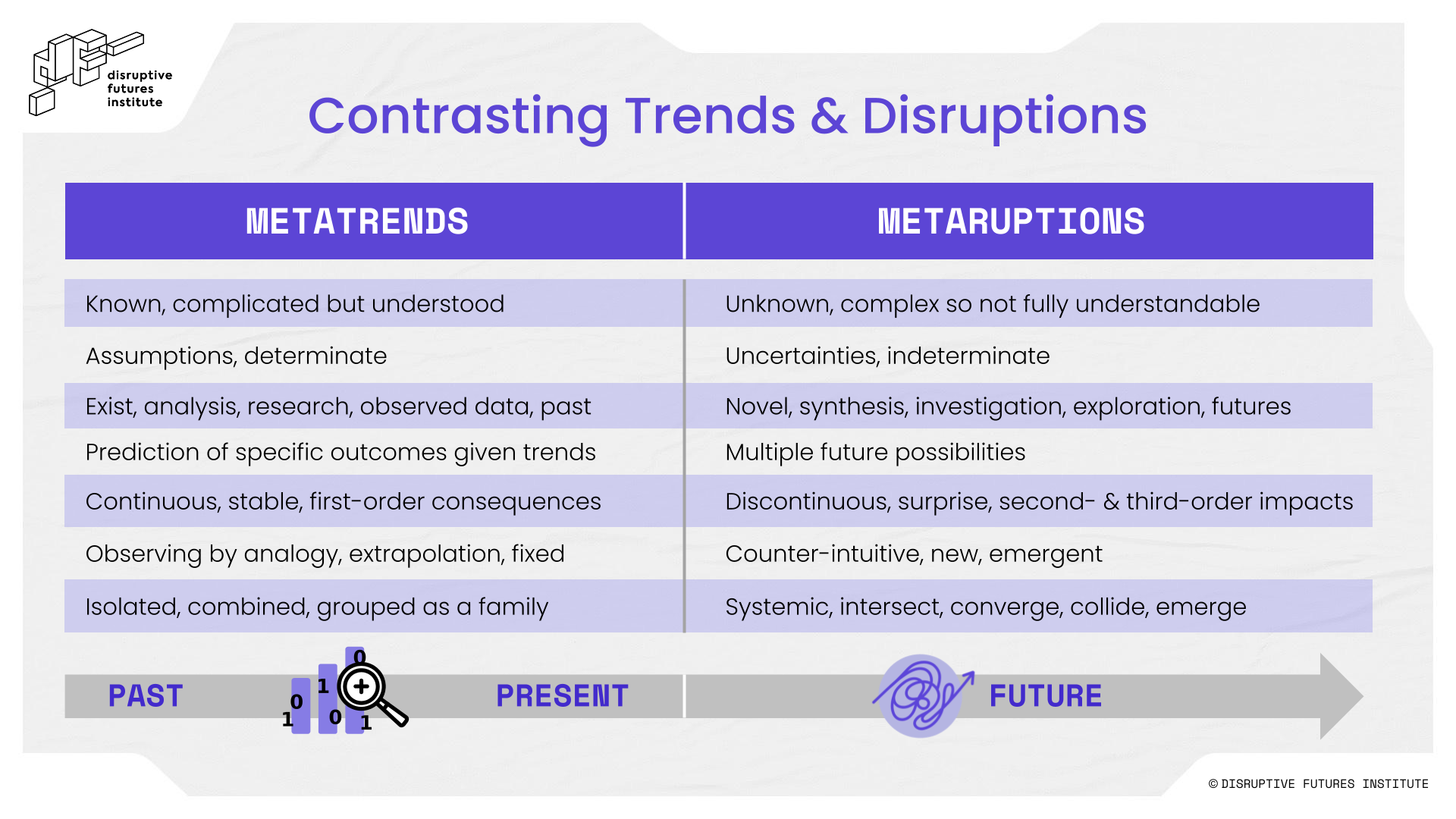
“Contrasting Trends & Disruptions” Source: Disruptive Futures Institute
Next, he explored why systems innovation is a prerequisite for impact and sustainable value creation. The true impact of innovation lies in catalyzing positive transformations across our complex systems. Addressing the world’s most critical challenges impactfully requires exercising our agency to achieve systems-level change and innovation, not isolated fixes. Disruption’s power is not its disruptiveness, but the ability to unlock new possibilities.
Third, Roger presented a new operating system for today’s unpredictable world. As the complexities of our world grow, the inherent uncertainty of the future intensifies. We must confront this unpredictability, discarding tired and outdated formulas, recognizing the diminishing effectiveness of pre-cooked playbooks. Too often, we act on flawed assumptions, believing in a world that is predictable, linear, stable, and controllable. However, in the face of constant change, the cost of maintaining business as usual rises significantly. Foresight gives all of us the agency to explore multiple possible futures, challenge assumptions, and move beyond the status quo.
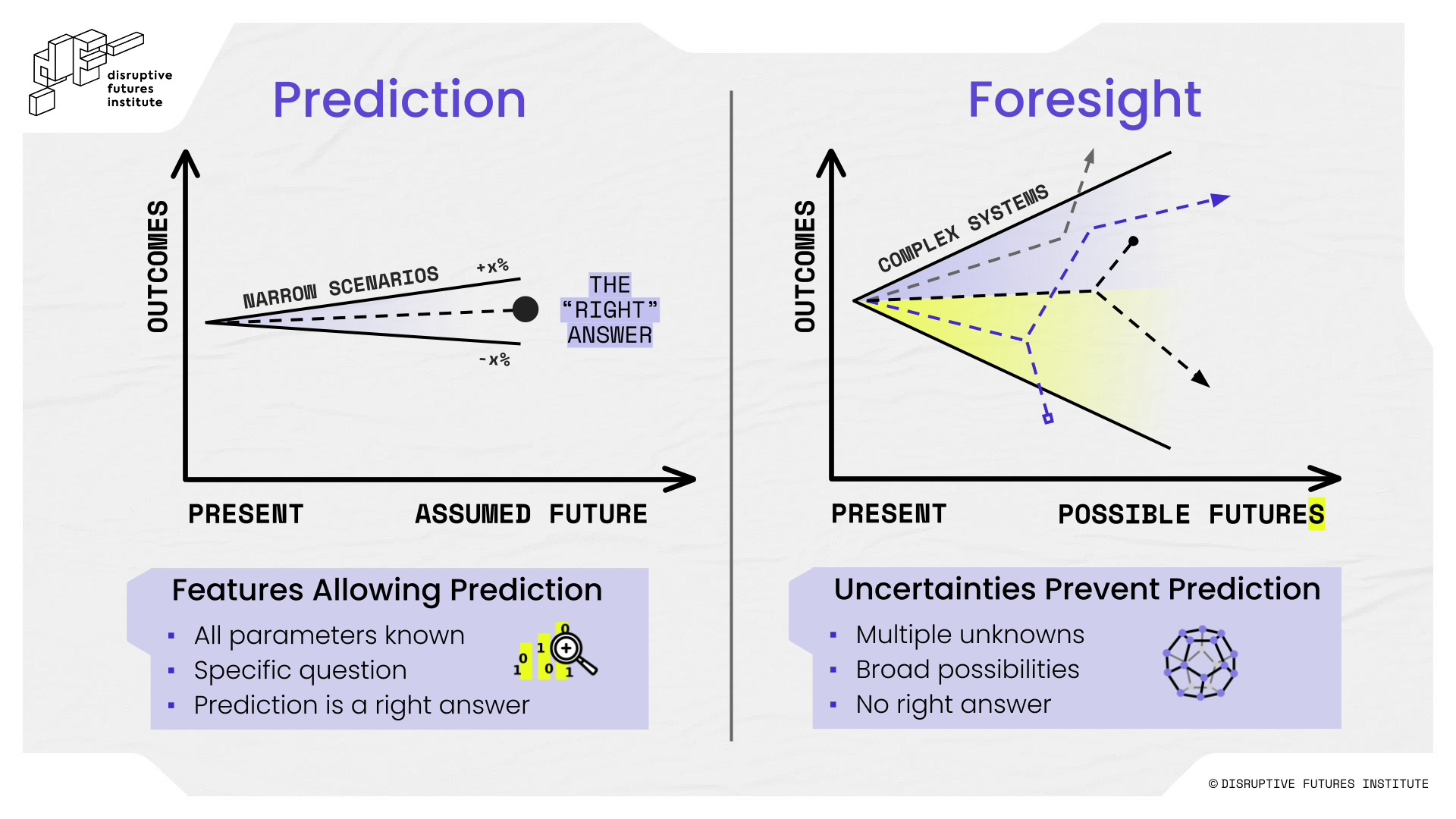
“Prediction versus Foresight” Source: Disruptive Futures Institute
Next, he discussed the future of artificial intelligence and strategic decision-making. AI is taking over areas previously thought too important to entrust to machines. Thus far, humans have excelled at decision-making, but our comparative advantage may not last. Ultimately, anything that can be automated, cognified, decentralized, digitized, disintermediated or virtualized will be. Roger presented his AAA Framework (Antifragile, Anticipatory, and Agility), which humans should develop to remain relevant as machines are learning fast:
- Antifragile: Building the right foundations for resilience and more.
- Anticipatory: Improving future-preparedness to navigate uncertainty.
- Agility: Responding to whatever futures emerge; reconciling the longer-term vision with the merging present, in the here and now.
He also presented the concept of “techistentialism”, which studies the nature of human beings, existence, and decision-making in our technological world. As AI develops, machines will become increasingly autonomous in making decisions, challenging us in a realm historically specific to humans. Here, the use of technology confronts the existential dimension. If technology is determining outcomes on our behalf, our agency is curtailed and our choices may be beyond our control. Today, humanity faces technological and existential conditions that can’t be separated. Techistentialism is Roger’s attempt to apply this philosophical perspective to sense-making and decision-making in our contemporary technocratic environment.
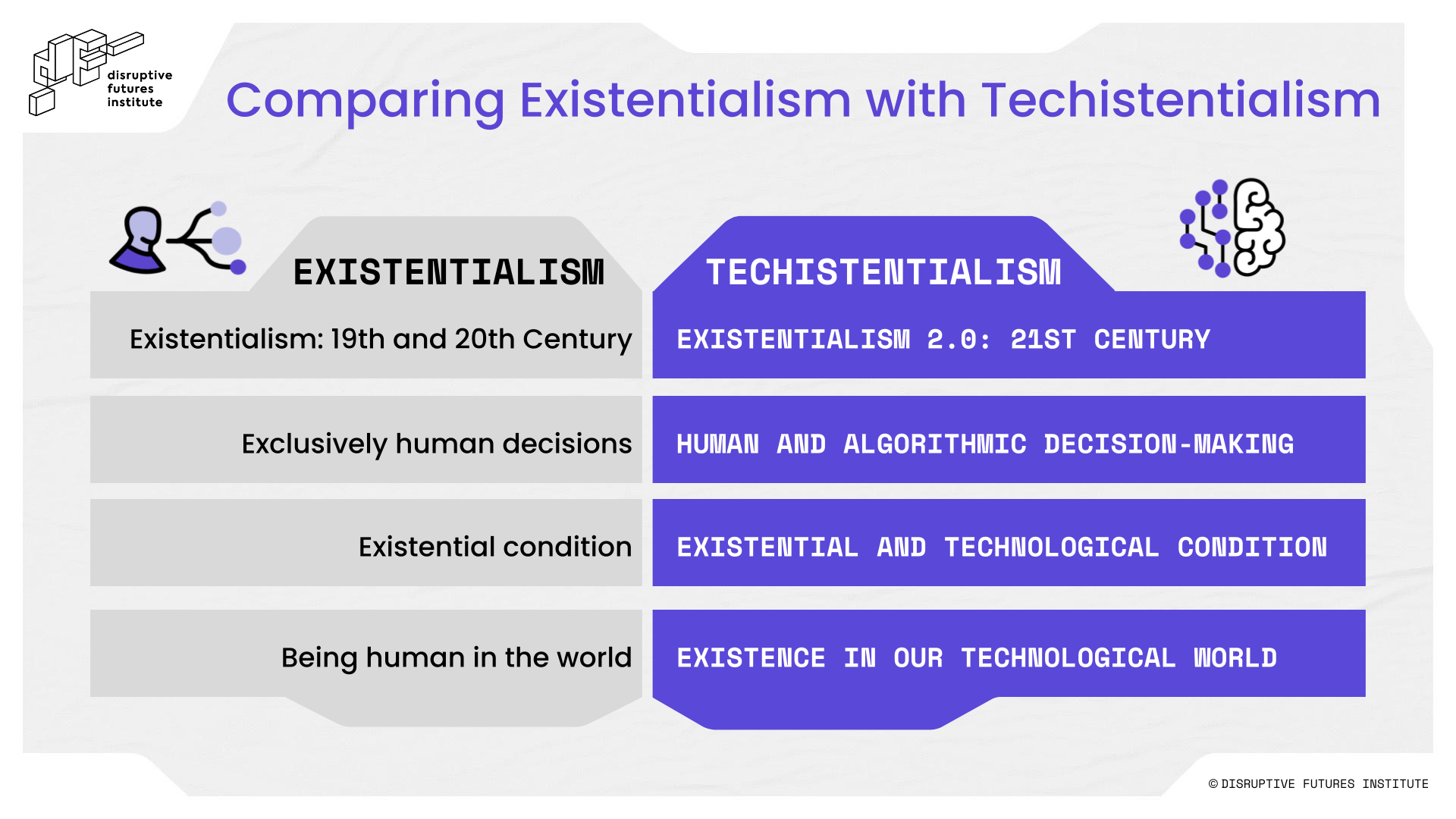
“Comparing Existentialism with Techistentialism” Source: Disruptive Futures Institute
Finally, Roger explained why clearly delineated “industries” and “sectors” are disappearing. Once-reliable boundaries between sectors are spilling over. From agriculture to construction, industries are converging, fusing, and transforming. Clearly delineated activities and assets are dissolving. Previously separate verticals now collaborate within new ecosystems, defying traditional classifications. Leaders, investors, and analysts should adopt new filters to evaluate companies and their fields. The futures are hybrid; in this liminal world, there are no industry boundaries.
After his talk concluded, Roger and the audience continued their evening with a cocktail hour, indulging in rich discussions, exchanges, and networking. Roger also signed custom copies of “Disrupt With Impact”, which were adorned with the Disruptive Futures Institute logo on the top of the front cover.
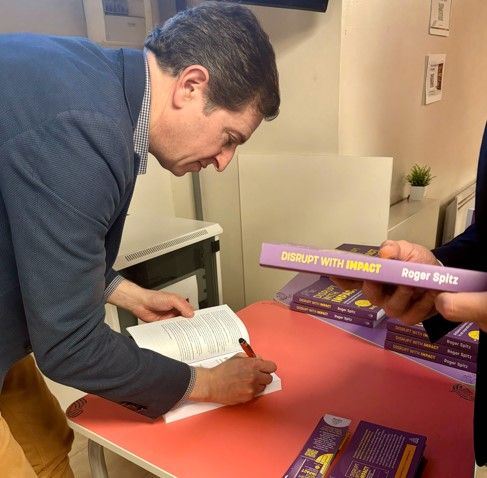
Cyber attacks, wars, pandemics, AI replacing humans, climate change, the splinternet, disinformation, and polarizations… What is happening in the world, and what can we do about it?
To all of the organizers, panelists, and attendees who made this event possible, Roger said the following: “Thanks to all who attended my talk in Paris! It was wonderful to share and exchange ideas with each and every one of you. Additionally, I am grateful to Fabienne Goux Baudiment, La Fabrique du Futur, ISC Paris, and HEC Paris Alumni for supporting our work at the Disruptive Futures Institute and inviting me to speak to further multiply the messages. Only by journeying forward together can we be empowered to explore the uncharted waters of the futures with confidence, to build resiliency and drive the changes we need.”
Published by La rédaction

